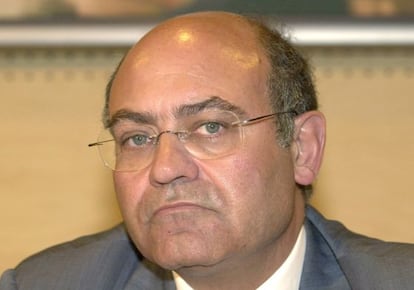Former employer group chief sentenced to two years and two months for tax fraud
Ex-CEOE chairman Gerardo Díaz Ferrán also ordered to pay fine of 99 million euros in connection with Aerolíneas Argentinas deal


The former head of Spain’s largest business association, Gerardo Díaz Ferrán, was sentenced on Tuesday morning to two years and two months in jail for tax offenses. Antonio Mata, who is the former chief executive of airline Air Comet and ex-chairman of Aerolíneas Argentinas, was also given the same sentence.
The High Court judge in charge of the case, José María Vázquez Honrubia, ruled that both executives were guilty of tax fraud committed in 2001, after not declaring credits to the value of $272 million, which were granted by Spanish state investment holding company SEPI to Interinvest, the parent company of airline Air Comet, to settle the debts that had been run up by the Argentinean airline.
As well as the prison term, the judge ordered the businessmen to pay a fine of 99.04 million euros, which is the equivalent of the amount defrauded. The men have also been banned from obtaining state subsidies or grants, as well as being denied the right to enjoy tax and social security incentives for four years and six months, and the right to be elected to a public position during the same period of time.
The public prosecutor had accused the former partners at the bankrupt Air Comet of deliberately “hiding” the increase in assets brought about by the deal in 2001 to “reduce the tax consequences.”
Díaz Ferrán bought Aerolíneas Argentinas for nominal
According to the prosecutor’s conclusions, in November 2000, SEPI acquired 99.2 percent of the shares in Interinvest, a company that was registered in Argentina, and in turn owned 92 percent of the capital of Aerolíneas Argentinas and 90 percent of Austral, a domestic airline. Both companies were running high losses.
In October 2001, SEPI sold its shares in Interinvest to Air Comet for the symbolic price of one US dollar. The deal was signed by the then-president of SEPI, Ignacio Ruiz-Jarabo, and the accused in the name of Air Comet and the other two companies that were shareholders in the Spanish airline.
In the contract, the state body assumed the liabilities of Aerolíneas Argentinas for a maximum amount of 300 million dollars. SEPI paid this amount into the account of Interinvest.
The three partners in Air Comet paid off debts to the amount of 272.87 million dollars (207.357 million euros,) loans that were granted to Air Comet with the commitment of later transferring them to the capital of Aerolíneas Argentinas. Given that the loans granted to Air Comet were still in effect, this operation meant that the company had turned a profit for which it should have declared 99.04 million euros in corporate taxes.
Díaz Ferrán, who is currently in preventive custody in the Soto del Real prison, in the Madrid region, has also been named as a suspect in a number of cases with the High Court, for having pocketed 4.4 million euros from the bankruptcy of his travel company Grupo Marsans, and for having faked the sale of his companies to avoid having to pay his creditors.
He has already been found guilty of wrongdoing in the bankruptcy of the travel company, for which he will have to pay debts with his partners to the tune of 400 million euros. He is also being investigated as a member of the board of failed savings bank Caja Madrid for the sale of preferred shares to ordinary savers, who thought that they were investing in deposits rather than sophisticated financial products.
Díaz-Ferrán was the head of the Spanish Confederation of Business Organizations (CEOE), which is the country's largest employer group. A police raid on Díaz Ferrán’s home in Madrid last year unearthed 150,000 euros in cash along with one kilo of gold.
Tu suscripción se está usando en otro dispositivo
¿Quieres añadir otro usuario a tu suscripción?
Si continúas leyendo en este dispositivo, no se podrá leer en el otro.
FlechaTu suscripción se está usando en otro dispositivo y solo puedes acceder a EL PAÍS desde un dispositivo a la vez.
Si quieres compartir tu cuenta, cambia tu suscripción a la modalidad Premium, así podrás añadir otro usuario. Cada uno accederá con su propia cuenta de email, lo que os permitirá personalizar vuestra experiencia en EL PAÍS.
¿Tienes una suscripción de empresa? Accede aquí para contratar más cuentas.
En el caso de no saber quién está usando tu cuenta, te recomendamos cambiar tu contraseña aquí.
Si decides continuar compartiendo tu cuenta, este mensaje se mostrará en tu dispositivo y en el de la otra persona que está usando tu cuenta de forma indefinida, afectando a tu experiencia de lectura. Puedes consultar aquí los términos y condiciones de la suscripción digital.








































